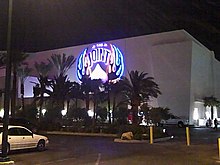Hard Rock Hotel and Casino (Las Vegas)
[36] Morton had purchased an option that year to buy an adjacent parcel occupied by Las Vegas Discount Golf & Tennis, which would be replaced by the intended expansion of the Hard Rock.
[39][40] The purchase increased Morton's ownership to 90 percent, while the remainder was held by investors such as film producer Jon Avnet and MTV chairman Tom Freston.
That month, Morton had plans for an expansion that would include a new hotel tower, a six-story parking garage, a health spa, and an enlargement of the Hard Rock Beach Club.
Morton purchased the land owned by Las Vegas Discount Golf & Tennis for $8.5 million, and the sale increased the Hard Rock's total property size to more than 18 acres.
The expansion cost a final total of $100 million, and included 35 suites, four new restaurants, the Baby's nightclub, 6,000 sq ft (560 m2) of meeting space, and a bigger pool.
Morton had county approval to add another 350-room tower, but he felt that such an addition would hamper the Hard Rock's boutique hotel nature: "I think if we grew this much larger ... it would definitely lose that intimacy and that ability to make the product personal."
The expenses brought increased revenue, and the resort had plans to eventually add extra banquet space, several new high roller suites, and a few additional floors in the parking garage.
That month, Morton announced plans for a $1 billion condo hotel addition, consisting of four towers with a total of at least 1,500 units, to be built on the newly acquired property.
[107] Analysts and investors were initially skeptical about Morgans' financial ability to purchase the Hard Rock, as the company was a boutique hotel operator with only eight properties.
[6][109] In November 2006, Morgans announced that it had signed an agreement with Credit Suisse's DLJ Merchant Banking Partners to help finance its purchase of the Hard Rock.
[119] The dispute related to an alleged agreement that the Hard Rock made to rent out its entertainment venues, which NorthStar claimed to be a violation of the loan provisions.
[159] In late February 2011, Nevada regulators approved a plan for the Las Vegas-based Warner Gaming to take over operations of the resort from Morgans Hotel Group.
Through the deal, Hard Rock Hotel lender Brookfield Asset Management would also invest additional capital in the resort and take over the stake held by Morgans.
[162] The Hard Rock Hotel experienced another year of financial loss in 2011, because of the poor local economy and new competition from the Cosmopolitan of Las Vegas, which targeted the same demographic of young, hip people.
[167][168] Actor Ben Affleck, a longtime gambler at the Hard Rock,[169][170] was permanently banned from the casino's blackjack tables in May 2014, on suspicions of card counting.
[193][192] As part of the Virgin project, the Hard Rock Cafe was demolished in November 2019, making room for landscaping, additional valet parking, and vehicle for hire companies.
[205][206] At the time of its opening, the resort contained $2 million worth of music memorabilia, including concert outfits worn by Aerosmith, Lenny Kravitz, Madonna, and Van Halen.
[25] Other items included one of Elton John's pianos, a drum kit used by Stone Temple Pilots, and the shoeshine stand that James Brown worked at as a child.
[209] When Morton agreed to sell the Hard Rock in 2006, the sale agreement included all of the music memorabilia, with the exception of two items that his sons wanted: a floral print jacket and Flying V guitar, both used by Hendrix.
[333][334] The 2004 video game Grand Theft Auto: San Andreas features numerous fictional casinos based on real ones, such as the V-Rock Hotel, inspired by the Hard Rock.
[341] The 25th season of The Real World, which premiered in 2011, was filmed partially in a suite at the Hard Rock's Casino Tower, which served as the living quarters for the show's participants.
The five-count complaint alleged that several instances of inappropriate sexual conduct had occurred at Baby's one year earlier and that security guards there allowed the activity to proceed.
[374] Later that year, and into 2010, undercover detectives initiated sting operations and found that they were easily able to acquire illegal drugs from employees of the Hard Rock's nightclubs.
The lawsuit alleged that the resort was being portrayed as "a destination that revels in drunken debauchery, acts of vandalism, sexual harassment, violence, criminality and a host of other behavior".
[384][385] In January 2004, the Nevada Gaming Control Board filed a three-count complaint against the Hard Rock for its past advertising, some of which was deemed sexually suggestive.
[382][386] Included in the complaint was a billboard ad that was shown during the National Finals Rodeo that featured a woman with panties down around her ankles, accompanied by the slogan, "Get ready to buck all night."
[388] Some opinion writers also believed that the control board was misusing its power to harass the resort over its advertising, infringing on free speech rights covered by the First Amendment.
[402] One commissioner concluded that Siller had threatened the Hard Rock when he said, earlier that month, that he would seek disciplinary action against the resort's gaming license if future ad violations occurred.
[410] The motion stated that a government agency could not censor content that it deems inappropriate, and that, "Moreover, given current Las Vegas community standards, the advertisements, as a legal matter, also cannot be characterized as obscenity.
"[407] Nevada attorney general Brian Sandoval argued that the Hard Rock was not eligible for free speech, and that state regulations took precedence over constitutional arguments.












